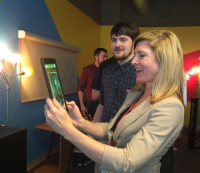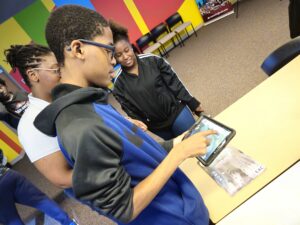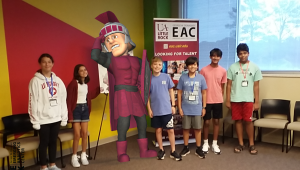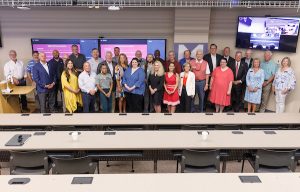June 26, 2019

Attendees of the first-ever National Computer Science Summit for State Leaders in Arkansas toured the Emerging Analytics Center at the University of Arkansas at Little Rock on June 10 to learn about the latest innovations in virtual reality and computer science.
The summit included representatives from 26 states, including national and international leaders in the field of computer science education, who met to discuss issues such as academic standards, teacher training, budgets, and development of computer science education policy.
“This group consists of leaders of computer science education from across the nation,” said Dr. Carolina Cruz-Neira, director of the Emerging Analytics Center. “A lot of the work we do here is a good example of how to get students motivated to learn about computer science and see what they can create. The Emerging Analytics Center is a very high-end place in Little Rock where we are leading the development of these technologies.”
From his first months in office, Gov. Asa Hutchinson has promoted the expansion of computer science education in Arkansas, starting with his signature on Arkansas Act 187, which required all the state’s public and charter high schools to offer a course in computer coding. As these students complete high school, state officials are at a juncture where a clear pathway is needed for these students to transition from high school to college and the workforce.
“There are very few jobs today that don’t require advanced computer prowess. As we look at jobs that children will have in 10, 20, and 30 years in the future, you have to think about how these jobs will look in the future,” said Anthony Owen, state director of computer science and chief state STEM officer. “We are leading the nation in K-12 education in computer science. We want educators who are ready to teach these students. We want to create a seamless transition from K-12 education to higher education to the workforce to meet industry needs.”
Researchers at the Emerging Analytics Center demonstrated multiple projects created with industry partners, representing how the computer science skills students are learning in the classroom can be used as a future career.
One of the apps demonstrated is a virtual visit to Hytrol, an Arkansas-based company, where visitors can see working virtual models of the company’s latest products and appreciate Hytrol’s innovative technology for conveyor systems.
“The real workforce at the Emerging Analytics Center is the students. Everything you see here is created by the students,” Cruz-Neira said.
Emerging Analytics Center researchers also created an educational augmented reality application targeted to art museums. The app allows users to interact with the art work through their cell phones to learn more about the piece and the artist.
Heather Lageman, a summit participant and executive director of leadership development at Baltimore County Public Schools, said she has read about this type of technology in the news and can see how beneficial it would be for students.
“I love this app,” Lageman said. “It’s a game changer for students who might not have the opportunity to visit many museums. It allows students to interact with the art in a very personal way.”






